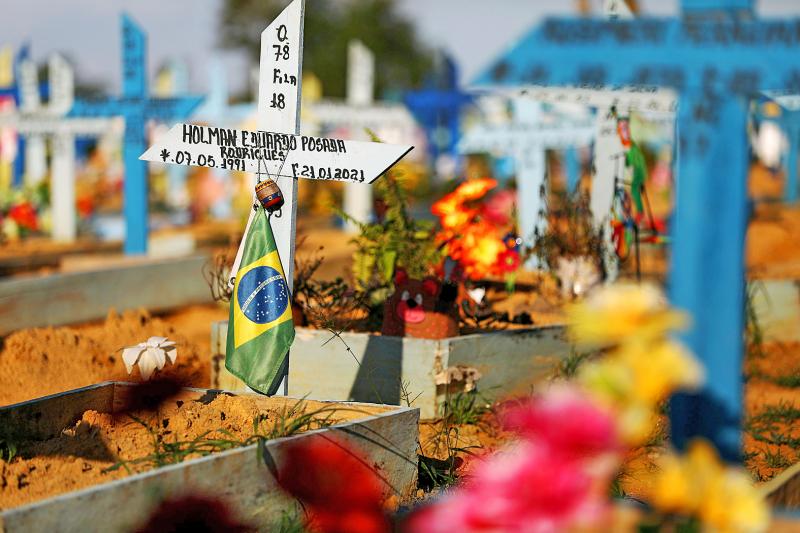Latin America and the Caribbean on Friday passed 1 million COVID-19 deaths as the IMF proposed a US$50 billion plan to end the pandemic, aiming to expand global immunization drives.
Since COVID-19 was first detected in Latin America in Sao Paulo in late February last year, Agence France-Presse has recorded more than 1,001,400 fatalities — almost 30 percent of the global total — and more than 31.5 million cases.
Nearly 90 percent of those deaths have been recorded in just five countries: Brazil, Mexico, Colombia, Argentina and Peru.

Photo: Reuters
“People aren’t taking care, none of us are being careful and we want to go out and travel,” said Alicia Sepulveda, a resident of Buenos Aires, Argentina, which went on a nine-day lockdown beginning yesterday after Argentine President Alberto Fernandez said it was facing its “worst moment” yet in the pandemic.
Latin America suffers from a lack of access to vaccines and medical supplies, and has only finished immunizing 3 percent of its population, according to the Pan American Health Organization.
Globally, the real number of dead from the pandemic was “at least two to three times higher than officially reported,” Samira Asma, the WHO’s assistant director-general in charge of data, told reporters.
In Washington, the IMF proposed a US$50 billion recovery plan with the aim of having at least 60 percent of the world’s population vaccinated by the end of next year.
The amount pales in comparison to the massive stimulus rolled out by rich nations, including the latest US$1.9 trillion US package.
“One of the key messages of this proposal is that the amount that’s needed is not very big,” IMF chief economist Gita Gopinath said.
Meanwhile, vaccine firms pledged to supply billions of doses to poorer nations by the end of next year at the Global Health Summit in Rome, which was part of the G20 talks.
Vaccine makers Pfizer, Moderna and Johnson & Johnson promised 3.5 billion doses at cost or discount to middle and low-income countries this year and next.
“It is a very clear ‘no’ to health nationalism,” European Commission President Ursula von der Leyen told the G20 after the EU pledged 100 million doses and to invest in manufacturing hubs in Africa to reduce reliance on imports.
Germany chipped in later on Friday, donating 30 million doses to poorer countries this year.
Vaccines are offering hope that nations can finally emerge from the pandemic that has ravaged the global economy and killed more than 3.4 million people since the end of 2019.
In Europe, the tourism sector looked on track to start a cautious resumption as Spain said it would open its borders to all immunized travelers from June 7.
Spanish Prime Minister Pedro Sanchez also said that all British travelers would be welcomed in for holidays — without even needing to present a negative COVID-19 test.
However, in sharp contrast, Germany said it would from today require people arriving from the UK to quarantine for two weeks because of the spread there of a coronavirus variant first found in India.
Germany on Friday opened beer gardens, terraces and pools in some parts of the country for the first time in months.

US President Donald Trump yesterday announced sweeping "reciprocal tariffs" on US trading partners, including a 32 percent tax on goods from Taiwan that is set to take effect on Wednesday. At a Rose Garden event, Trump declared a 10 percent baseline tax on imports from all countries, with the White House saying it would take effect on Saturday. Countries with larger trade surpluses with the US would face higher duties beginning on Wednesday, including Taiwan (32 percent), China (34 percent), Japan (24 percent), South Korea (25 percent), Vietnam (46 percent) and Thailand (36 percent). Canada and Mexico, the two largest US trading

AIR SUPPORT: The Ministry of National Defense thanked the US for the delivery, adding that it was an indicator of the White House’s commitment to the Taiwan Relations Act Deputy Minister of National Defense Po Horng-huei (柏鴻輝) and Representative to the US Alexander Yui on Friday attended a delivery ceremony for the first of Taiwan’s long-awaited 66 F-16C/D Block 70 jets at a Lockheed Martin Corp factory in Greenville, South Carolina. “We are so proud to be the global home of the F-16 and to support Taiwan’s air defense capabilities,” US Representative William Timmons wrote on X, alongside a photograph of Taiwanese and US officials at the event. The F-16C/D Block 70 jets Taiwan ordered have the same capabilities as aircraft that had been upgraded to F-16Vs. The batch of Lockheed Martin

GRIDLOCK: The National Fire Agency’s Special Search and Rescue team is on standby to travel to the countries to help out with the rescue effort A powerful earthquake rocked Myanmar and neighboring Thailand yesterday, killing at least three people in Bangkok and burying dozens when a high-rise building under construction collapsed. Footage shared on social media from Myanmar’s second-largest city showed widespread destruction, raising fears that many were trapped under the rubble or killed. The magnitude 7.7 earthquake, with an epicenter near Mandalay in Myanmar, struck at midday and was followed by a strong magnitude 6.4 aftershock. The extent of death, injury and destruction — especially in Myanmar, which is embroiled in a civil war and where information is tightly controlled at the best of times —

China's military today said it began joint army, navy and rocket force exercises around Taiwan to "serve as a stern warning and powerful deterrent against Taiwanese independence," calling President William Lai (賴清德) a "parasite." The exercises come after Lai called Beijing a "foreign hostile force" last month. More than 10 Chinese military ships approached close to Taiwan's 24 nautical mile (44.4km) contiguous zone this morning and Taiwan sent its own warships to respond, two senior Taiwanese officials said. Taiwan has not yet detected any live fire by the Chinese military so far, one of the officials said. The drills took place after US Secretary